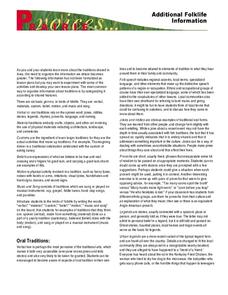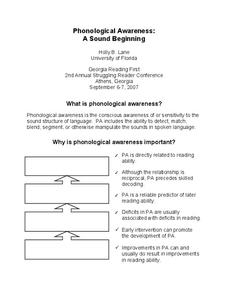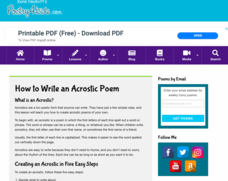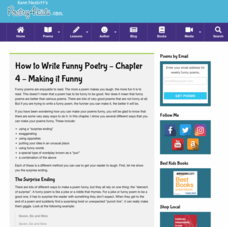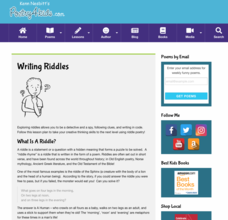Ed Worksheets
Read the Story
Want to boost your readers' comprehension skills and strategies? Look to these five pages, each with a short story and questions to answer covering main idea, facts, sequence of events, context clues, conclusions, and making inferences.
Super Teacher Worksheets
Writing Couplets
Sometimes, getting started is the hardest part; but that is not the case with this poetry worksheet that asks scholars to read through a list of rhyming pars, choose three, and use them to write a couplet poem.
Teachnology
Shape (Or Concrete) Poems
Poetry comes in all shapes and sizes. Young writers pick a shape, select words and phrases that describe how the shape makes them feel, and create a shape poem. A raindrop example and step-by-step instructions give your budding poets a...
Seussville
The Lorax's Earth Day
Add a touch of Dr. Seuss whimsy to your Earth Day celebration with six pages consisting of Earth-friendly, inspiring, and engaging activities designed to enhance the beauty of your school campus and showcase the famous story, The Lorax.
University of Northern Iowa
Additional Folklife Information
Use a packet packed with ideas for how to celebrate the traditions of your country, state, community, and pupils's families. Suggestions for how to draw on oral and material traditions, customs, beliefs, music, and stories all find a...
Seussville
Hooray For Diffendoofer Day!
Eleven engaging activities make up a story guide that accompanies Dr. Seuss' Hooray For Diffendoofer Day! Scholars design a fictional classroom setting including scary face tests, writing job descriptions, adapting the book into a play,...
University of Florida
Phonological Awareness: A Sound Beginning
Choose from a variety of phonological activities to complement a reading lesson. The guide goes through the basic components of good phonics instruction focusing on sound types, levels of phonological awareness, assessment methods, and...
Generation Rx
Medication Safety Patrol: Trivia Game
It trivia time! Small groups work collaboratively to answer questions all about medication safety. Groups earn points with each correct response, and as the ultimate game changer, they wager all or a portion of their points on one final...
Curated OER
Poetic Elements
Poetry is all about sound and rhythm. The sound of the words, the rhythm of the lines, and the emotional atmosphere created by these elements and the literary devices poets use, compress whole stories into a few stanzas. The specialized...
Roald Dahl
The Twits - The Twits Get the Shrinks
Turn readers into investigative journalists. The 11th and final lesson that accompanies The Twits by Roald Dahl asks the question "What happened to Mr. and Mrs. Twit?" The lesson uses mind maps and group discussion to help answer the...
College of the Canyons
Free Verse
Free verse poetry is often regarded as poetry without structure, but in reality, it is a poetic form that adheres to its own poet's thought and breath patterns. Delve into the rules and famous examples of free-verse poetry with a short...
University of North Carolina
Poetry Explications
Explication may sound like a fancy word, but it's just a fancy way to say analysis. Using a handout on poetry explications, part of a larger series on specific writing assignments, writers learn how to break down and analyze a poem. The...
Wordpress
Notes on Romeo and Juliet – Act 2
If your purpose in using Romeo and Juliet with your classes is to share enjoyment rather than to just read the play by rote, come and inspect these materials designed for the scenes in Act II of Shakespeare's tale of star-crossed lovers.
Ohio Department of Education
A Glossary of Literary Terms
If you're tired of defining allusion, onomatopoeia, and satire for your language arts students, hand out a complete list of literary devices to keep the terms straight. Each term includes a definition that is easy to understand and...
Poetry4kids
How to Write an Alliteration Poem
Learners follow five steps to compose an alliteration poem. They choose one consonant and brainstorm as many nouns, verbs, and adjectives they can think of to create rhyming sentences that come together in a poetic fashion.
Poetry4kids
Alliteration and Assonance Lesson Plan
Scholars analyze the poem My Puppy Punched Me in the Eye by Ken Nesbitt in order to locate examples of alliteration and assonance. After reading the poem, alliterative words are underlined and assonant words are circled.
Poetry4kids
How to Write a Free Verse Poem
Budding poets compose an original free verse poem. Encouraged to use personification and alliteration, scholars read over three tips and examples then try their hand at drafting a poem of their own style.
Poetry4kids
How to Recite a Poem like an Expert
Don't just read a poem, recite a poem! Add speaking skills to a poetry unit with an activity that promotes successful poem recitation. Scholars choose a poem then recite it with the help of several tips and videos.
Poetry4kids
How to Write an Acrostic Poem
Acrostic poems are perfect for any topic! A quick tutorial guides learners into writing acrostic poems with the basics and key examples.
Poetry4kids
How to Write Funny Poetry — Chapter 4: Making It Funny
You've got your topic—now how do you make your poem funny? Explore ways to make a poem humorous, including puns, exaggeration, silly words, and surprising endings, with a helpful poetry lesson.
Poetry4kids
How to Write a “Backward” Poem
If you like poetry, wait till you try backward poetry! Young writers read Shel Silverstein's "Backward Bill" before writing their own funny poems that are full of backward imagery and phrasing.
Poetry4kids
How to Write a “Favorite Things” List Poem
If your students made a list of their favorite things, would writing poetry be on it? After this poetry writing lesson, it might! Young writers make a list of what they like—or what they don't like—before crafting the list into a rhyming...
Poetry4kids
How to Write a Repetition Poem
A repetition poem is the focus of a lesson that challenges scholars to compose an original piece. To add meaning to their poem, authors choose words to repeat at the start of most lines.
Poetry4kids
Writing Riddles
What's got 60 eyes, 150 fingers, and an endless number of ideas? Your language arts class! Challenge young writers to come up with clever riddles with an online poetry lesson.
Other popular searches
- Nursery Rhymes
- Rhyme Scheme
- Worm Rhyme
- Internal Rhyme
- Rhyme and Repetition
- Writing Nursery Rhymes
- Acting Out Nursery Rhymes
- Favorite Nursery Rhymes
- Onomatopoeia Nursery Rhymes
- Rhyme and Verse
- Words That Rhyme
- Poetry Rhyme Scheme






